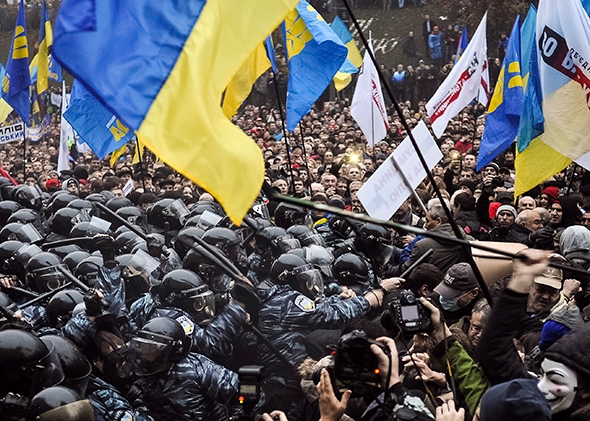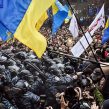
Failure to Sign Association Agreement with EU Triggers Violence in Ukrainian Capital
Publication: Eurasia Daily Monitor Volume: 10 Issue: 215
By:

Ukrainian President Viktor Yanukovych refused to sign an association and free-trade agreement with the European Union at the Eastern Partnership summit in Vilnius on November 29. He blamed this on Russian pressure and the West’s failure to provide assistance. Nevertheless, EU officials said the doors to Ukraine would remain open. Yanukovych asserted the deal would eventually be signed, and there are no indications for the time being that he will instead agree to join the Moscow-led Customs Union of Russia, Belarus and Kazakhstan. Yanukovych’s decision prompted protests in Ukraine on a scale unseen since the Orange Revolution, which started exactly nine years ago. These protests degenerated into violence last weekend, triggering a serious political crisis in Kyiv.
On November 21, the Ukrainian government unexpectedly said it was stopping its preparations for the signing of the Association Agreement (AA) and the Deep and Comprehensive Free Trade Area (DCFTA) agreement with the EU. In explaining his government’s decision, Prime Minister Mykola Azarov cited the need to improve trade relations with Russia after Moscow threatened Kyiv with sanctions should the latter sign the deal with Brussels. Furthermore, on November 22, Azarov said that the International Monetary Fund’s (IMF) refusal to approve a new loan for Ukraine—instead demanding new austerity measures of Kyiv—was the final deciding factor in pausing the country’s European integration process (UNIAN, November 21, 22). Yanukovych and Azarov had hoped that if the deal with the EU were signed, Washington and Brussels would persuade the IMF to soften its conditions on issuing a new loan and, presumably, provide Ukraine with more assistance should Russia carry out its threats to launch a retaliatory economic blockade of the country.
The EU reportedly agreed to drop its demand for President Yanukovych to free the imprisoned former prime minister, Yulia Tymoshenko, ahead of the summit, which has been Europe’s main condition for several years (Inter TV, November 29). However, Yanukovych made it clear on his arrival to Vilnius that he had made up his mind not to sign the deal with the EU. “I have been alone for three and a half years, one on one with Russia in very unequal conditions,” he told German Chancellor Angela Merkel, adding that Kyiv could not afford to lose its access to the Russian market in the absence of international economic assistance (UNIAN, November 29).
Ahead of the Eastern Partnership summit in Vilnius, Yanukovych estimated that Ukraine needed 160 billion euros ($217 billion) in fiscal aid to make up for the predicted disruption in trade with Russia. That figure was quite unexpected and most probably exaggerated. He also offered to hold trilateral consultations with the EU and Russia, which Russian President Vladimir Putin had himself called for earlier. The EU rejected both demands, and Yanukovych did not sign the Association Agreement. However, top EU officials said they would be ready to sign the deal as soon as Ukraine was ready, and Yanukovych said he hoped this would happen shortly. Several sources said the agreement with the EU could be signed in spring 2014 (Interfax, Ukrainska Pravda, November 29). Ukrainian Foreign Minister Leonid Kozhara told 1+1 TV on December 1 that talks on an AA with the EU would be resumed this week, and Prime Minister Azarov told Inter TV that the EU agreed to discuss financial assistance.
However, EU-Ukraine relations are likely to deteriorate in the short term due to violence in Kyiv this past weekend. The news from the Vilnius summit prompted protesters, who had been demonstrating in the streets since November 21 in favor of signing the agreement with the EU, to demand President Yanukovych’s impeachment as well as Prime Minister Azarov’s dismissal. Late on November 29, riot police attacked the protesters with truncheons. More than 30 people, including foreign journalists, were taken to the hospital (Channel 5, November 29, 30).
On November 30, Interior Minister Vitaly Zakharchenko admitted that excessive force had been used against the demonstrators, and Kyiv’s chief of police resigned. Moreover, Serhy Levochkin, President Yanukovych’s chief of staff, also reportedly submitted his resignation. But these resignations came too late. On December 1, tens of thousands of angry Ukrainians took to the streets, demanding that the government step down over the failure to sign the association agreement as well as over the violence in Kyiv. Buses and trains full of protesters arrived in the capital city from western Ukraine, and barricades were put up in the streets. Several thousand protesters spent last night (December 1–2) in Kyiv’s central Independence Square (the Maidan) and the trade unions building. Indeed, as many observers noted, the situation on the ground has become quite reminiscent of 2004 when angry protesters had thwarted the government’s plans to rig presidential elections in favor of Yanukovych (Channel 5, Ukrainska Pravda, December 1). And although Yanukovych eventually won the next presidential elections, held in 2010, the current ongoing violence in Kyiv is putting the future of Ukraine’s democracy into doubt as the government reportedly considers introducing a state of emergency.
Protesters occupied the mayoral office and the official trade unions headquarters in Kyiv on December 1, and early on December 2 they blockaded the entrances to the government building. The most radical members of the crowd had also tried to storm Yanukovych’s office on December 1 (Channel 5, December 1). Dozens were injured in the large-scale clashes with riot police that ensued.
The protests, as well as the scale of the violence, may destabilize the ruling Party of Regions and Azarov’s government. Indeed, several parliamentary deputies have already quit the party after the weekend clashes between protesters and the police. Therefore, if the Maidan demonstrations do not subside, a pro-opposition majority may emerge in the parliament, just like what happened in 2004. Ukraine’s opposition leaders had called for a strike last weekend, and their appeals clearly found support in the western regions. However, President Yanukovych’s strongholds in the east and south remain generally calm or even hostile to the pro-EU protesters. So for now, at least, it appears the country’s east-west divide has not yet disappeared since nine years ago, when the largely pro-Russian Ukrainian East backed Yanukovych.




